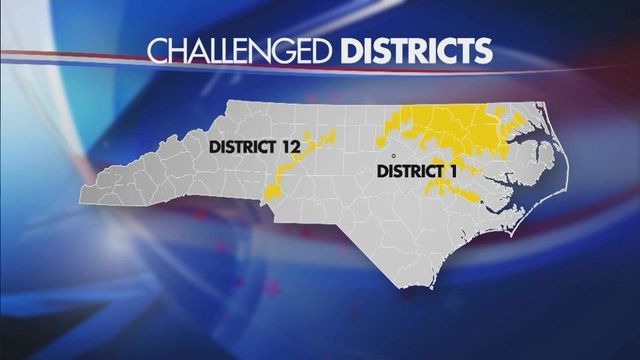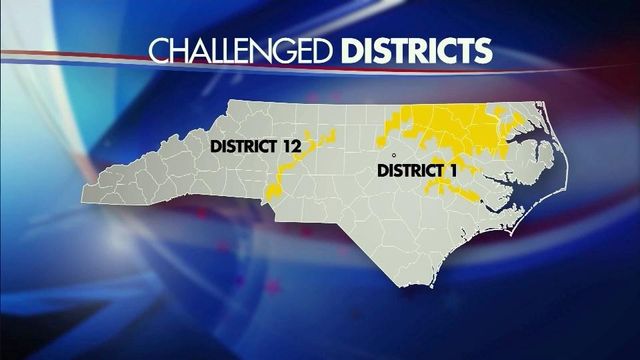NC redistricting case heads to US Supreme Court
A trio of federal judges on Tuesday refused to delay their order that North Carolina redraw its congressional districts map before holding elections for the state's 13 U.S. House members.
That rejection was quickly appealed to the U.S. Supreme Court by state election officials.
The three-judge panel ruled last week that North Carolina lawmakers had unconstitutionally relied on race when drawing two districts: the 1st Congressional District, which is based in eastern North Carolina and currently held by Democratic Congressman G.K. Butterfield, and the 12th Congressional District, which stretches from Charlotte to Greensboro and Winston-Salem and is held by Democratic Congresswoman Alma Adams.
Although that order finds only two districts unconstitutional, they touch so many other districts that the bulk of North Carolina's federal elections map will have to be redrawn.
North Carolina voters are already casting ballots by mail. As of Monday, 9,860 voters had requested mail-in absentee ballots, and 668 of those have been cast.
This week, North Carolina lawmakers and the State Board of Elections asked the court to stay its ruling and allow the March 15 primaries to go forward until the case could be appealed. The panel that heard the case originally dismissed that plea.
"The defendants vaguely suggest that there will be irreparable harm to the 'citizens of North Carolina' if the Court denies the motion," U.S. District Judge William Osteen wrote for the three-judge panel Tuesday. "The Court does not know who the defendants are referring to when they mention, broadly, 'citizens.' What is clear is that the deprivation of a 'fundamental right, such as limiting the right to vote in a manner that violates the Equal Protection Clause, constitutes irreparable harm.'"
Read the order
"This Court should stay enforcement of the judgment immediately," reads the state's appeal, which points to the fact that voters are already submitting ballots. "The primary election day for hundreds of offices and thousands of candidates is less than 40 days away and, if the judgment is not stayed, it may have to be disrupted or delayed."
Elections officials say they aren't taking sides on whether the districts are well drawn but say the case could create additional confusion in a year that has already seen court battles over voter ID and other election procedures.
"Our biggest hope is to ensure that the courts have a full picture of what this, practically, will do," said Josh Lawson, general counsel for the North Carolina State Board of Elections.
Lawson repeated earlier advice to voters who have already requested absentee ballots for the March 15 primary to vote how they normally would and not to "make an attempt to self-censor." Officials don’t yet know how many districts would be affected by redrawn maps, but he said elections officials will be responsible for making sure every vote counts.
"Go ahead and vote your ballot however you'd like," he said. "Leave to the Board of Elections the legal side of whether that will be certified in congressional races."
Meredith College political professor David McLennan said that with the primary fast approaching, lawmakers may need to act now in case the final outcome does not go their way.
"On the eve of a primary, we should have had this figured out a long time ago," he said. "This puts the state in an awkward situation. The Governor may have to call the General Assembly to redraw the maps."
Another possible option, McLennan said, would be to move forward, but delay voting for U.S. House candidates until everything is sorted out.
"Now, that is very expensive for the state. Some estimates are over $9 million to run a special primary, but it could allow time for the process to carry out."
The state's Democratic Party has been among the most vocal critics of the state's redistricting plan and celebrated Tuesday's ruling.
"The Court has now spoken once again. The Republican districts are unconstitutional and must be redrawn immediately," North Carolina Democratic Party Chairwoman Patsy Keever said in a statement. "It’s time for Governor McCrory and legislative Republicans to quit stalling and restore integrity and basic fairness to North Carolina’s congressional elections."
In addition to lawyers representing the state, the General Assembly has a separate legal team defending the districts.
"We are disappointed in the federal trial court’s decision because there is so much uncertainty on whether the primary election already underway can continue or whether a new primary election needs to take place – and whether votes that have already been cast can be counted," read a joint statement from Rep. David Lewis, R-Harnett, and Sen. Bob Rucho, R-Mecklenburg, the two lead authors of North Carolina's maps. "We hope the U.S. Supreme Court will recognize the urgency and gravity of these questions and issue a stay."
More Background
swipe or use the A/D keys or the buttons to navigate
North Carolina's Congressional District 12, currently represented by Greensboro Democrat Alma Adams, snakes up the Interstate 85 corridor and includes areas in Charlotte, the Triad and several cities in between. It was one of two districts federal judges found unconstitutional on Feb. 5, ruling they were drawn across racial lines.
Census estimates from 2014 show the district has a population of more than 778,000. About 51 percent of its residents are black, compared with about 22 percent for the state as a whole.
Even prior to redistricting by the Republican-led General Assembly in 2011 however, District 12's odd shape has been used by critics as a clear example of gerrymandering to capture certain demographics. But federal judges in Friday's ruling took careful note of the increase of the district's black voting age population from 43.8 percent to 50.7 percent in the most recent move to redistrict.
"Such a consistent and whopping increase makes it clear that the general assembly's predominant intent regarding district 12 was also race," Circuit Judge Roger Gregory wrote for the majority.
As of Feb. 5, 354 people in the district requested absentee ballots for the March 15 primary, according to the State Board of Elections.
Judges only invalidated two of the state's 13 districts, giving lawmakers two weeks to redraw them before a Feb. 19 deadline. That's less than a month before the state's March 15 primary.
But the problem is a cascading one — District 12 shares borders of varying sizes with five other Congressional districts covering the western part of North Carolina. Lawmakers won't have to redraw them all, but a few of them are likely to be affected by any change.
The multi-tentacled District 1, which looms over a largely rural portion of northeastern North Carolina, drew similar criticism from federal judges in the Feb. 5 ruling. It's home to more than 740,000 people, about 53 percent of whom are black. Judges note that although the district has been "an extraordinarily safe district for African-American preferred candidates of choice for over twenty years," the 2011 redistricting increased its black voting age population from 47.8 percent to 52.7 percent.
"This quota was used to assign voters to CD 1 based on the color of their skin," Circuit Judge Roger Gregory wrote for the majority, declaring that the lines violate the Equal Protection Clause of the 14th Amendment.
As of Feb. 5, 587 people had requested absentee ballots here, but Democrat Rep. G.K. Butterfield is running unopposed in the March 15 primary.
To an even greater extent than the 1st, the 12th congressional district's large reach and irregular shape means it borders nearly half of the state's districts.
Redrawing it could potentially impact the territories of Republicans Renee Ellmers, Walter Jones, Mark Walker, David Rouzer and George Holding, as well as Democrat David Price.
With the state now appealing for an emergency stay from federal courts, elections officials are still urging voters to complete and return any outstanding absentee ballots. But absent that stay, state lawmakers will return to Raleigh next week to vote on the redrawn maps.
Explore the districts
Use the map to explore North Carolina's congressional districts on your own.
District 1
U.S. Representative:
Absentee ballots requested:
(As of Feb. 5)
DEMOGRAPHICS
Total population:
White: % // Black: %
Hispanic: % // Not Hispanic: %
Source: 2014 American Community Survey, State Board of Elections











